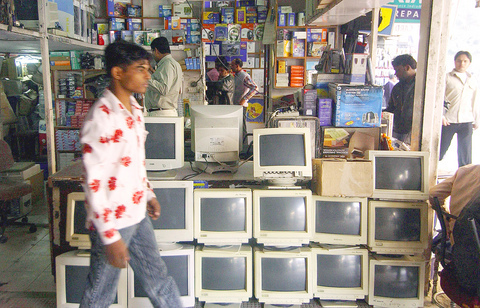Listening attentively, Winny Kao (
Kao was part of an audience eager to know how to sell their products at minimal risk in India, a rising star of the so-called BRIC (Brazil, Russia, India and China) nations with vigorous economic growth potential.
India, the world's second-most populous nation after China, could potentially sustain strong GDP growth of 8 percent for the next two years, but high oil prices could slow the pace, according to the UN's latest report.

PHOTO: AFP
"We've got to learn about the Indian market and be prepared [for any investment] to keep pace with our customers," Kao told the Taipei Times at a forum held by the Market Intelligence Center (
Giantplus, which owns plants in Taiwan and Shanghai, now supplies flat panels to mobile phone companies such as the world's No 2 handset vendor Motorola Inc.
Motorola, the US phone giant, plans to open its first factory in India within a year and a half and will sell cheap handsets at prices as low as US$35 each in the world's second-largest mobile phone market in an attempt to boost its market share.

FILE PHOTO: WANG YI-HUNG, TAIPEI TIMES
India only had 81 million cellphone users as of last year, despite having a total population of about 1 billion, according to statistics provided by the Industrial Technology Research Institute (ITRI,
Eying the growth potential, Giantplus represents in miniature the growing trend among local manufacturers of diversifying Chinese investment to India, although Taiwan's cumulative investment in India totalled less than US$20 million as of the end of last year.
From computer chipset maker VIA Technologies Inc (
"The list is long. Any company you name has the same ambition," Kao said.
Over the past two decades, Taiwanese manufacturers have built as many factories as they could in China to boost their shrinking profit margins by taking advantage of cheap labor and preferential tax schemes for foreign companies offered by Beijing.
As of last month local companies had invested US$48.17 billion in China since 1991, according to the government's latest tally. Computer makers like Quanta Computer Inc (
But things are changing.
Taiwanese have latched onto a new trend and are now carefully assessing India in a bid to capture business opportunities. At the same time, the government has also felt the need to strategically shift its focus to India as the country has emerged as an economic power in recent years.
On Feb. 11, the semi-official Taiwan-India Cooperation Council was established, with Democratic Progressive Party Chairman Yu Shyi-kun elected as chairman.
The council aims to foster ties between the two countries while reducing the risks associated with the nation's over-reliance on China's market. Meanwhile, the Ministry of Economic Affairs' Bureau of Foreign Trade also plans to organize a trade delegation visit to India this summer.
"Recently, we have arranged an increasing number of trips to southern Asia, including India, for members to scout the investment environment," said Luo Huai-jia (
This shift coincided with Beijing's decision to revoke tax preference for foreign corporations early next year. India, on the other hand, is sweetening tax incentives to boost foreign investment.
Cheap labor and a massive domestic market are two of the most important factors for corporate executives in deciding where to invest.
"India has got both. Favorable tax schemes give the southern Asian nation an upper hand in winning more foreign investors' attention," ITRI analyst Max Deng (
The Indian government recently said that it would scrap import taxes on technology products soon as well as exempting manufacturers from income tax for 10 years after opening new plants, said Deng, who just returned from a visit to India.
Foxconn International Holdings Ltd (FIH,
Following in the footsteps of its major client Nokia Oyj, Foxconn last month signed an agreement with the local government of Tamil Nadu for a 20-hectare site where it will open its first factory in India making computers and cellphones in the industrial city of Chennai, only a 15-minute trip from Nokia's factory.
"FIH's move mainly aims to provide a better service for its clients. That also improves local EMS [electronics manufacturing service] providers' chances of catching up with their international rivals in having plants globally," said Tony Tseng (
For similar reasons, Compal Communications Inc (
"Companies selling branded products, however, are eying the increasing purchasing power in India," Deng said.
According to International Data Corp's (IDC) forecast in January, India will continue to enjoy the fastest-growing domestic information technology market in the Asia Pacific region, at 19 percent this year, outpacing even China, which would expand at 12 percent.
Taiwanese mobile phone vendor BenQ Corp (明基) said last week that it planned to sell own-brand liquid-crystal-display (LCD) monitors in India after gaining a foothold in the handset market there.
Dopod International Corp (
The company will target high-end phones to avoid direct competition with Nokia and Motorola at the cheaper end of the market.
But high risk always goes with fat profits.
"The barriers to entering India are high," Deng warned.
"Companies interested in tapping into the Indian market need to be well-prepared for difficult situations," he said.
However, government corruption, ever-changing government polices, lack of sound infrastructure and insufficient supplies of power and water increase investment risks, Deng said. Language and cultural differences could also be problems, he said.

The US government has signed defense cooperation agreements with Japan and the Philippines to boost the deterrence capabilities of countries in the first island chain, a report by the National Security Bureau (NSB) showed. The main countries on the first island chain include the two nations and Taiwan. The bureau is to present the report at a meeting of the legislature’s Foreign Affairs and National Defense Committee tomorrow. The US military has deployed Typhon missile systems to Japan’s Yamaguchi Prefecture and Zambales province in the Philippines during their joint military exercises. It has also installed NMESIS anti-ship systems in Japan’s Okinawa

TRAGEDY STRIKES TAIPEI: The suspect died after falling off a building after he threw smoke grenades into Taipei Main Station and went on a killing spree in Zhongshan A 27-year-old suspect allegedly threw smoke grenades in Taipei Main Station and then proceeded to Zhongshan MRT Station in a random killing spree that resulted in the death of the suspect and two other civilians, and seven injured, including one in critical condition, as of press time last night. The suspect, identified as a man surnamed Chang Wen (張文), allegedly began the attack at Taipei Main Station, the Taipei Fire Department said, adding that it received a report at 5:24pm that smoke grenades had been thrown in the station. One man in his 50s was rushed to hospital after a cardiac arrest

‘WIN-WIN’: The Philippines, and central and eastern European countries are important potential drone cooperation partners, Minister of Foreign Affairs Lin Chia-lung said Minister of Foreign Affairs Lin Chia-lung (林佳龍) in an interview published yesterday confirmed that there are joint ventures between Taiwan and Poland in the drone industry. Lin made the remark in an exclusive interview with the Chinese-language Liberty Times (the Taipei Times’ sister paper). The government-backed Taiwan Excellence Drone International Business Opportunities Alliance and the Polish Chamber of Unmanned Systems on Wednesday last week signed a memorandum of understanding in Poland to develop a “non-China” supply chain for drones and work together on key technologies. Asked if Taiwan prioritized Poland among central and eastern European countries in drone collaboration, Lin

ON ALERT: Taiwan’s partners would issue warnings if China attempted to use Interpol to target Taiwanese, and the global body has mechanisms to prevent it, an official said China has stationed two to four people specializing in Taiwan affairs at its embassies in several democratic countries to monitor and harass Taiwanese, actions that the host nations would not tolerate, National Security Bureau (NSB) Director-General Tsai Ming-yen (蔡明彥) said yesterday. Tsai made the comments at a meeting of the legislature’s Foreign Affairs and National Defense Committee, which asked him and Minister of National Defense Wellington Koo (顧立雄) to report on potential conflicts in the Taiwan Strait and military preparedness. Democratic Progressive Party (DPP) Legislator Michelle Lin (林楚茵) expressed concern that Beijing has posted personnel from China’s Taiwan Affairs Office to its